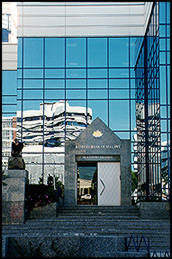 BUILDING ECONOMIC STABILITY BUILDING ECONOMIC STABILITY |
The transition into the globalized economy has not been an easy process for Malawi. "On the political side, a main challenge was the ushering in of a democratic culture, which meant that we had to set up democratic institutions" recalls the Right Honourable Justin Malewezi, Vice-President and Minister Responsible for Privatization.
"On the economic side" adds Malewezi, "we inherited a very volatile economic system in 1994 – inflation was very high, foreign exchange reserves were very low and the government deficit was very big and unsustainable".
The new government got down to work to control inflation and bring down the government deficit, succeeding until 1998 when the Kwatcha, Malawi’s local currency, devaluated by about 48 %. Although the economy was hard hit and inflation grew, the country is now finding a balance and working to build its foreign reserves. "We have done much work in this area, bringing the deficit down from 20% of GDP to just under 5%, and we intend to lower it even further" maintains Malewezi.
The recent 2000-2001 central government budget was a significant departure from past practices. It demonstrated a bold attempt by the Muluzi government to put in place concrete measures that will contribute towards a definitive alleviation of poverty.
Efforts to improve the macro-economic environment are taking centre stage, and the government is establishing yardsticks to reduce and consistently maintain a low (possibly single digit) rate of inflation. This situation should lead to lower interest rates, thereby stimulating industrial and general economic growth.
| 
Recent attempts were also made by the Reserve Bank as well as the Ministry of Finance to bring the inflation rate down and the interest rates to normal, strengthening overall macro levels. Now that the Malawi Kwatcha has stabilized, it seems as though the country’s economy is back on track.
However, one of the major challenges to Malawi’s economy has been the liberalization of its public and private sectors to successfully build its capacity and its ability to compete regionally and internationally. As a result of these pressures to modernize, the government has been encouraging investment and looking to the private sector to assume the leading role in the economic development of the country. |

